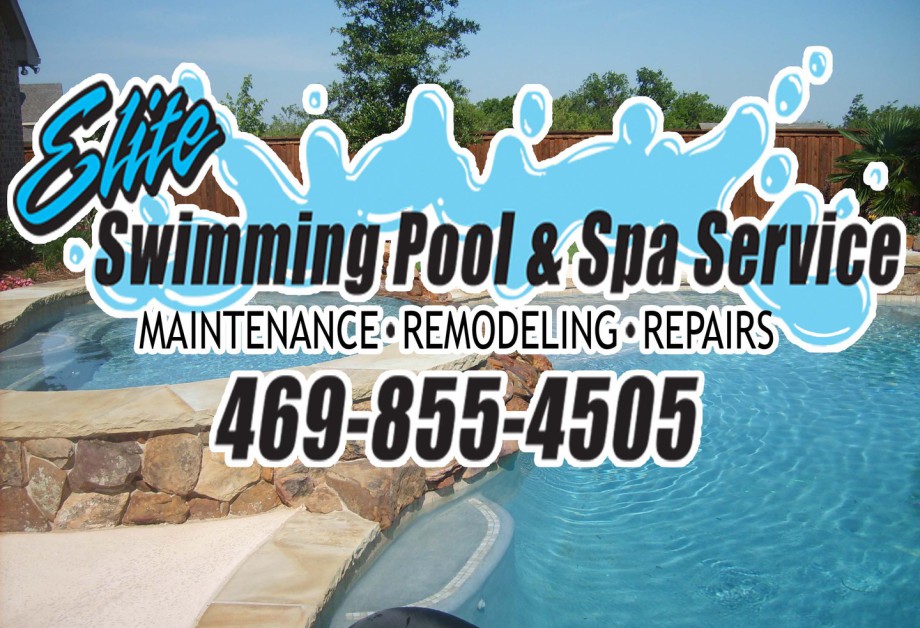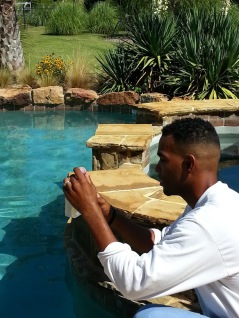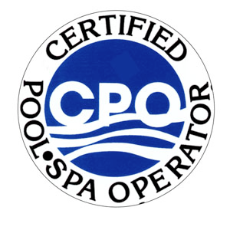
Tips
Chlorine is a chemical element that was first discovered by a chemist named Carl Scheele in 1774. It forms when salt water is put through the process of electrolysis, and is one of the most commonly used chemicals in the United States. When chlorine and water are combined, a mixture of hydrochloric acid and hypochlorous acid forms. Hypochlorous acid is chlorine in its active form, and it has a sanitizing effect on swimming pool water.
The standard level of chlorine in a swimming pool does not pose a danger to swimmers. However, the chemical’s handling and administration demand a high degree of care. One must always follow the instructions carefully. The typical chlorine level in a swimming pool is not thought to have a significant effect on the environment as it is similar to that in most tap water.
About the Author: Angelo Rodriguez, Jr., is the owner of Elite Swimming Pool & Spa Service. The company provides comprehensive pool care, including the routine maintenance of chlorinators, to its customers.
Salt water pools are becoming more and more popular at both commercial and residential properties, but not everyone knows what a salt-water pool is or how it differs from a traditional pool. Here are some tips for those looking to invest in a salt water pool:
Advantages:
-Salt water pools use chlorine, but it is not placed directly into the pool. Instead, chlorine is released from the salt in the pool through a process called electrolysis.
-The water in salt water pools is usually less harsh on the skin and eyes.
-Since salt water pools do not need chlorine, owners do not have to buy or keep chlorine for the pool.
Disadvantages:
-Salt water pools can use more electricity than traditional pools because of the salt water generator.
-They still require regular maintenance and upkeep.
-Salt water pools can be more conducive to algae growth.
Elite Swimming Pool & Spa Service provides maintenance, cleaning, and repair services for traditional and salt water pools.
Elite Swimming Pool & Spa Service provides equipment installation, cleaning, leak detection, and repairs. The company takes pride in its high quality of customer service and commitment to client satisfaction.
During the winter months, out-of-use pools and spas frequently fall lower on owners’ priority lists. What many do not realize is that such amenities still require attention. Described below are several important tips for keeping your pool or spa in the best shape after the summer passes.
1. Trim trees and shrubs around the pool area. This can help minimize limbs and branches that fall into the pool and affect drainage.
2. Check and clean out filter baskets more often in the fall and winter. Even if vegetation is properly pruned, leaves and pine straw will inevitably get into the water.
3. In the event of a freeze, wait for any ice to melt before removing it from the cover. Ice shards can slice covers, which can be expensive to replace.
4. Tightly secure your pool cover. A slack cover could blow off or tear high in winds.
1. Sharks & Minnows
Played in the deep end, this game starts
with one “shark” who yells “Dinner time!” Every “minnow” that is lined
up on one side of the pool has to jump in and try to get to the other
side while avoiding the shark. Minnows who get caught then become
sharks. The last minnow wins.
2. Ping-pong scramble
Get a bunch of ping-pong balls together, and with a marker, write a number
from 1 to 10 on each one. Divide your group into two teams. Dump all the
balls in the middle of the pool and then blow a whistle to signal the
start of the game. Each person can swim out and bring balls back to the
side, but only one ball at a time. When all the balls are gone, add up
the numbers on each team’s balls, and the highest number wins.
3. Hide the bottle
This version of “hide the bacon” begins by splitting the group into two
teams. Each team gets to hide the bacon, but in this game, the bacon is a
clear 2-liter bottle filled with water. The bottle will sink and become
virtually impossible to see underwater.
Operating in the Dallas-metro area, Elite Swimming Pool & Spa Service offers seasonal
upkeep services, including control-system check-ups, valve lubrication,
and chlorinator support.
Pool maintenance is essential for keeping a pool safe and swimmers healthy, but keeping a maintenance schedule for a pool takes a lot of time and effort. Some pool owners think that all they need to do is skim the pool every few days to get leaves and other debris out of the water, but pool maintenance requires much more than the occasional surface cleaning.
In addition to removing debris, the pool lining needs to be regularly vacuumed or brushed, pool chemicals need to be checked and balanced, all filters need to be cleaned, and pumps and other working parts need to be checked.
For the average pool owner, this amount of regular maintenance can be difficult to accomplish, but it is essential to ensure that a pool is clean and safe and that all of its elements are working properly.
Many pool owners are interested in learning how to increase energy efficiency in order to save money on their pools. Angelo Rodriguez, Jr., of Elite Swimming Pool & Spa Service currently works on pools in Plano, Dallas, Rockwell, and the cities in the surrounding region. He is able to detect pool leaks and repair mechanical issues and thereby help his customers save on costs.
Using a pool cover consistently is one simple way to improve a pool’s energy efficiency. In fact, over 90 percent of the pool’s heat dissipates at the surface. Additionally, Elite Swimming Pool & Spa Service recommends the use of an energy efficient pool pump to minimize the power usage.
Several cities in Texas also offer Smart Energy loans or tax incentives for homeowners who purchase solar-based pool parts. For example, the city of Plano operates a local loan program for borrowers who want to get into solar pool heating.
While professional pool cleaning organizations like Elite Swimming Pool & Spa Service in Royse City, Texas, can help pool owners by completing maintenance and repair for them, some individuals choose to clean their pools themselves. In order to do this job properly, a pool owner will need at least the items below.
-
Pumps and filters. This equipment helps remove bacteria from the pool water, which keeps the water safe for swimmers of all ages.
-
Automatic pool cleaners. Using a pool vacuum like a Polaris machine or a Kreepy Krauly automatic cleaner helps keep the pool free of leaves and other fragments that may contaminate the water. These machines scoot around the bottom of the pool and remove small debris.
-
Brushes, nets, and skimmers. These tools, which can be used to scoop litter from the pool water, require a little more manual labor but can save on energy costs.
Operating in the greater Dallas area, Elite Swimming Pool & Spa Service offers refurbished equipment like the items listed above at a very reasonable rate.
Although much of the country sweltered under a drought during the summer of 2012, soon enough the school year will start and the season will change to cooler weather. Though pool lovers may not want to say goodbye, in most cases closing down the pool is a necessity.
During the seven days before you close your pool, keep in mind a number of important steps that should be completed:
- First, bring the pH to between 7.2 and 7.6. Brush, vacuum, and shock the pool. Add long-lasting algaecide to the sanitizer after it has been readjusted. Gradually reduce the filtering times and turn off the heater.
- If you live in colder regions, you should close your pool when the nighttime temperature dips into the 40s on a regular basis, with the daytime temperature reaching the 60s and low 70s.
- In warmer areas, it may be difficult to completely close the pool, because the temperature remains warm enough to promote the growth of algae and bacteria. Regular maintenance is still required, though at a reduced rate. A cover will keep the area much safer and also reduce the growth of algae.
Elite Swimming Pool & Spa Service offers a range of maintenance, repair, and cleaning services to customers throughout the Dallas region.
Do you think that your swimming pool is leaking? Try the bucket test.
1. Fill your pool up to mid tile level. Fill a 5 gallon bucket with pool water to about 1 inch from the top.
2. Put the bucket on the first or second step of the pool to ensure that the bucket is immersed in the pool at least 5 inches.
3. Mark the water level inside the bucket.
4. Turn off the pump and mark the pool water level on the outside of the bucket.
5. Resume normal pool pump operation.
6. In 24 hours, compare the two water levels. If the pool water (the outside mark) goes down more than the bucket’s water level, there is probably a leak. If the levels are the same, only evaporation has occurred.
During a summer day, you can expect your pool to loose more water due to evaporation. In the case of rain, repeat the test. Test is invalid after 24 hours. If your pool is loosing a substantial amount of water on a daily bases, then call us today to discuss your options.





